#National Assembly of Pakistan
Explore tagged Tumblr posts
Text
Ladies, vote for yourself and those denied the right
Dhurnal (Pakistan) (AFP) – Perched on her traditional charpai bed, Naeem Kausir says she would like to vote in Pakistan's upcoming election -- if only the men in her family would let her.
Issued on: 05/02/2024 - 08:41
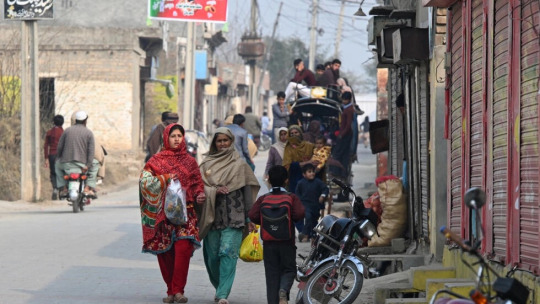
In the village of Dhurnal in Punjab, spread across crop fields and home to several thousand people, men profess myriad reasons why women should not be allowed to vote © Farooq NAEEM / AFP
Like all the women in her town, the 60-year-old former headmistress and her seven daughters -- six already university educated -- are forbidden from voting by their male elders.
"Whether by her husband, father, son or brother, a woman is forced. She lacks the autonomy to make decisions independently," said Kausir, covered in a veil in the courtyard of her home.
"These men lack the courage to grant women their rights," the widow told AFP.
Although voting is a constitutional right for all adults in Pakistan, some rural areas in the socially conservative country are still ruled by a patriarchal system of male village elders who wield significant influence in their communities.
In the village of Dhurnal in Punjab, spread across crop fields and home to several thousand people, men profess myriad reasons for the ban of more than 50 years.
"Several years ago, during a period of low literacy rates, a council chairman decreed that if men went out to vote, and women followed suit, who would manage the household and childcare responsibilities?" said Malik Muhammad, a member of the village council.
"This disruption, just for one vote, was deemed unnecessary," he concluded.
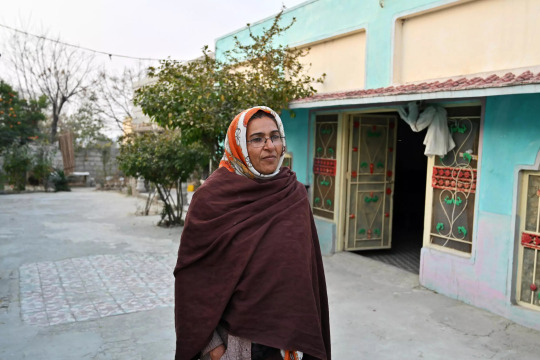
Robina Kausir, a healthcare worker, talks to AFP in Dhurnal of Punjab province, ahead of the upcoming general election © Farooq NAEEM / AFP
Muhammad Aslam, a shopkeeper, claims it is to protect women from "local hostilities" about politics, including a distant occasion that few seem to remember in the village when an argument broke out at a polling station.
Others told AFP it was simply down to "tradition".
First Muslim woman leader
The Election Commission of Pakistan (ECP) has stressed that it has the authority to declare the process null and void in any constituency where women are barred from participating.
In reality, progress has been slow outside of cities and in areas that operate under tribal norms, with millions of women still missing from the electoral rolls.
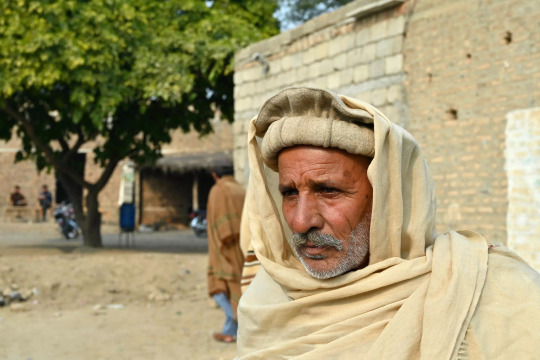
Muhammad Aslam, a shopkeeper, claims a ban on women voting is to protect them from "local hostilities" about politics © Farooq NAEEM / AFP
The elders in Dhurnal rely on neighbouring villages to fill a government-imposed quota which maintains that 10 percent of votes cast in every constituency must be by women.
Those who are allowed to vote are often pressured to pick a candidate of a male relative's choice.
In the mountainous region of Kohistan in Khyber Pakhtunkhwa province home to almost 800,000 people, religious clerics last month decreed it un-Islamic for women to take part in electoral campaigns.
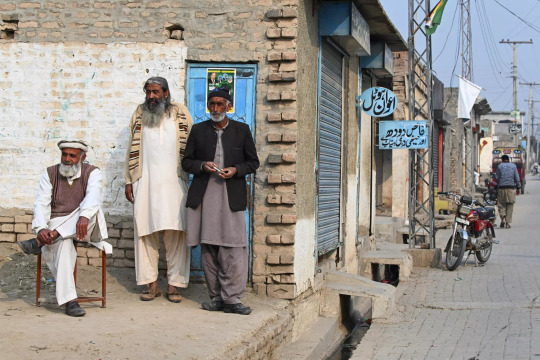
Although voting is a constitutional right for all adults in Pakistan, some rural areas in the socially conservative country are still ruled by a patriarchal system of male village elders who wield significant influence in their communities © Farooq NAEEM / AFP
Fatima Tu Zara Butt, a legal expert and a women's rights activist, said women are allowed to vote in Islam, but that religion is often exploited or misunderstood in Pakistan.
"Regardless of their level of education or financial stability, women in Pakistan can only make decisions with the 'support' of the men around them," she said.
Pakistan famously elected the world's first Muslim woman leader in 1988 -- Benazir Bhutto, who introduced policies that boosted education and access to money for women, and fought against religious extremism after military dictator Zia ul-Haq had introduced a new era of Islamisation that rolled back women's rights.
However, more than 30 years later, only 355 women are competing for national assembly seats in Thursday's election, compared to 6,094 men, the election commission has said.
Pakistan reserves 60 of the 342 National Assembly seats for women and 10 for religious minorities in the Muslim-majority country, but political parties rarely allow women to contest outside of this quota.
Those who do stand often do so only with the backing of male relatives who are already established in local politics.
"I have never seen any independent candidates contesting elections on their own," Zara Butt added.
'Everyone's right'
Forty-year-old Robina Kausir, a healthcare worker, said a growing number of women in Dhurnal want to exercise their right to vote but they fear backlash from the community if they do -- particularly the looming threat of divorce, a matter of great shame in Pakistani culture.
She credits part of the shift to access to information as a result of the rising use of smartphones and social media.
"These men instil fear in their women – many threaten their wives," she told AFP.
Robina, backed by her husband, is one of the few prepared to take the risk.
When cricketing legend Imran Khan swept to power in the 2018 election, Robina arranged for a minibus to take women to the local polling station.
Only a handful joined her, but she still marked it as a success and will do the same on Thursday's election.
"I was abused but I do not care, I will keep fighting for everyone's right to vote," Robina said.
#pakistan#Every vote counts#Men making up bs to prevent women from voting#Election Commission of Pakistan (ECP)#Men protecting women........from exercising their right to vote#Benazir Bhutto#only 355 women are competing for national assembly seats in Thursday's election compared to 6094 men
63 notes
·
View notes
Text
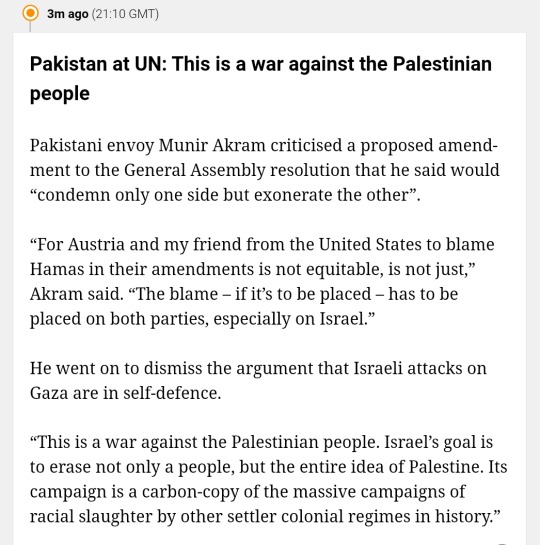
CALL EM OUT MUNIR

#free gaza#free palestine#gaza strip#irish solidarity with palestine#palestine#gaza#news on gaza#al jazeera#boycott israel#israel#Munir Akram#Pakistan#UNGA#United Nations General Assembly#I'm manic today don't @ me. I WISH I had alcohol goddamn.
47 notes
·
View notes
Text

🇵🇰🇺🇳🇵🇸🇮🇱
🚨 PAKISTAN THROWS ITS WEIGHT BEHIND A UN PROPOSAL TO PUT A PROTECTION FORCE ON THE GROUND IN THE GAZA STRIP
As the illegal Israeli siege and bombardment of Gaza continues unabated, Pakistan's Foreign Minister came out in support for a United Nations General Assembly proposal to deploy a "protection force" in Palestine.
"We need to consider ways to prevent a recurrence of this slaughter,” Pakistan's Foreign Minister, Munir Akram told the UN General Assembly.
Akram said that the foreign ministers of the Organization of Islamic Cooperation “have proposed deployment of a protection force to safeguard Palestinian civilians in the Gaza [Strip] and perhaps also in the West Bank."
"We should give serious consideration [to the proposal]," Akram said. "The Israeli killing machine must be stopped in Gaza and the West Bank.”
The Pakistani Foreign Minister went on to censure Israel's recent attacks on the United Nations Secretary General, Antonio Gutierrez who, although condemning Hamas' attacks on Israeli settlers, he also connected the attacks to the Israeli occupation and apartheid. Akram urged the General Assembly to "stand behind" the Secretary General.
"We are repelled by the crude and disrespectful Israeli response to the secretary-general’s circumspect and valid views. The General Assembly should collectively reject these insulting remarks and reaffirm our full confidence in the secretary-general,” Akram told the Assembly.
According to updated figures, some 7'326 Palestinians have been killed in Israel's attacks, including more than 3'000 children, with another 18'000 Palestinians injured.
#source
@WorkerSolidarityNews
#united nations#un general assembly#pakistan#pakistan news#palestine#palestine news#occupied palestine#gaza#gaza strip#gaza war#gaza news#free gaza#free palestine#israel#israel news#israeli war crimes#war crimes#crimes against humanity#israeli occupation#occupation#middle east#war#news#politics#war news#geopolitics#world news#international news#global news#WorkerSolidarityNews
43 notes
·
View notes
Text
Breaking News: Speaker National Assembly Orders Release of Arrested PTI Members
Islamabad – September 10, 2024In a significant development, the Speaker of the National Assembly, Sardar Ayaz Sadiq, has ordered the immediate release of all arrested Pakistan Tehreek-e-Insaf (PTI) members of the National Assembly (MNAs). The Speaker directed Inspector General (IG) Islamabad to release the detained MNAs and has demanded a detailed report on the entire situation surrounding their…
#Arrests#Ayaz Sadiq#IG Islamabad#Pakistan Politics#Parliament House#Political Tensions#PTI#PTI MNAs#Release Orders#Speaker National Assembly
0 notes
Text
Everything is in the manifesto: Farooq Abdullah on diplomatic initiatives between India and Pakistan
PULWAMA — Former Jammu and Kashmir Chief Minister Farooq Abdullah said on Tuesday that the Congress-National Conference alliance will get success in the upcoming assembly polls. When asked if his party, if elected, would push the Centre to resume talks with Pakistan, Farooq responded, “Sab manifesto mein hai…” (everything is in the manifesto). “This time, people are in a very good mood. The…
#Assembly Election#Farooq Abdullah#India-Pakistan Relations#Jammu and Kashmir (J&K)#National Conference (NC)#Politics
0 notes
Text
قومی اسمبلی کا ایک دن قوم کو کتنے میں پڑتا ہے؟

نئی قومی اسمبلی وجود میں آ چکی ہے۔ اس کے پہلے اجلاس کا ماحول دیکھا تو کرامزن کے ناول کا وہ چرواہا یاد آ گیا جو آتش فشاں پر بیٹھ کر بانسری بجا رہا تھا۔ میں نے سوشل میڈیا پر سوال اٹھایا کہ قومی اسمبلی کے ماحول سے لطف اندوز ہونے والوں کو کیا یہ معلوم ہے کہ قومی اسمبلی کا ایک دن قوم کو قریب آٹھ سو لاکھ میں پڑتا ہے؟ کچھ نے حیرت کا اظہار کیا، بعض نے اپنے تئیں تصحیح فرمانے کی کوشش کی کہ شاید یہ رقم آٹھ لاکھ ہے جو غلطی سے آٹھ سو لاکھ لکھ دی گئی ہے۔ قومی اسمبلی ایک سال میں قریب 135 دن اجلاس منعقد کرتی ہے۔ 2017 کے اسمبلی بجٹ کے مطابق پارلیمان کے ایک دن کے اجلاس کا اوسط خرچ ڈھائی کروڑ روپے سے زیادہ تھا۔ اس دوران کئی بار تنخواہوں اور مراعات میں اضافے کیے گئے۔ پوچھنے والا تو کوئی تھا نہیں کہ پارلیمان خود ہی فیصلہ ساز تھی اور اپنی مراعات کے فیصلے خود ہی کرتی تھی۔ ساتھ ہی مہنگائی بھی بڑھ رہی تھی اور اوسط اخراجات برھتے ہی جا رہے تھے۔ چند سال تک میں اس مشق سے جڑا رہا اور مراعات و معاوضے میں اضافے اور مہنگائی کی شرح کے حساب سے تخمینہ لگاتا رہا کہ بات اب کہاں تک پہنچی ہے۔
قریب 2020 میں تنگ آ کر اور تھک کر جب میں نے یہ سلسلہ منقطع کر دیا کیونکہ متعلقہ وزارتوں سے تازہ ترین معلومات اکٹھے کرتے رہنا ایک بلاوجہ کی مشقت تھی اور اس سے بہتر تھا کہ جنگل میں جا کر کسی چرواہے سے بانسری سن لی جائے۔ جس وقت یہ سلسلہ منقطع کیا اس وقت تک محتاط ترین اندازے کے مطابق یہ اخراجات دگنے ہو چکے تھے۔ اس کے بعد مہنگائی کا وہ طوفان آیا کہ الامان۔ اخراجات، مہنگائی اور افراط زر کی شرح کے مطابق اگر جمع تقسیم کی جائے اور انتہائی محتاط جمع تقسیم کی جائے تو اس وقت قومی اسمبلی کا ایک دن کا اجلاس قوم کو قریب آٹھ سو لاکھ میں پڑتا ہے۔ نہ جھکنے والے ، نہ بکنے والے ، عوام کے خیر خواہ ، کردار کے غازیوں اور بے داغ ماضیوں میں سے کوئی ایوان میں سوال کر دے کہ اسمبلی کے آخری مالی سال کے بجٹ کے مطابق تازہ ترین اعدادو شمار کیا ہیں اور مہنگائی کی اس لہر میں قومی اسمبلی کے ایک دن کا اجلاس اوسطا قوم کو کتنے میں پڑتا ہے تو جواب سن کر شاید بہت ساروں کو دن میں وہ تارے بھی نظر آ جائیں جو آج تک ماہرین ��لکیات بھی نہیں دیکھ سکے۔
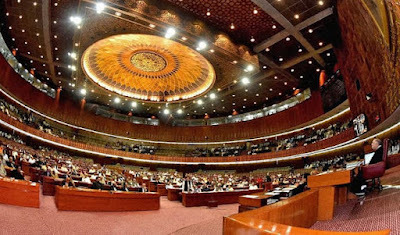
سوال البتہ اخراجات کا نہیں ہے۔ پارلیمان چلانی ہے تو اخراجات تو اٹھیں گے۔احساس کیا جائے تو اخراجات کم ضرور ہو سکتے ہیں لیکن پھر بھی ہوں گے تو سہی۔ اس لیے سوال اخراجات کا نہیں بلکہ کارکردگی کا ہے۔ چارجڈ ماحول میں ایک آدھ اجلاس تلخی اور اودھم کی نذر ہو جائے تو یہ ایک فطری سی بات ہے۔ لیکن اگر یہ مشق مسلسل جاری رہنے لگے تو پھر یہ ایک سوالیہ نشان ہے۔ عالم یہ ہے کہ قومی اسمبلی کے رولز آف بزنس کی دفعہ 5 کے مطابق صرف ایک چوتھائی اراکین بھی موجود ہوں تو کورم پورا تصور کیا جاتا ہے۔ اس کے باوجود ہم اکثر یہ خبر پڑھتے ہیں کہ کورم ٹوٹ گیا اور اجلاس ملتوی ہو گیا۔ گزشتہ سے پیوستہ سابقہ اسمبلی کے 74 فیصد اجلاس کا عالم یہ تھا کہ ان میں حاضری ایک چوتھائی سے بھی کم تھی۔ اس اسمبلی میں پارلیمانی لیڈروں میں سب سے کم حاضریاں عمران خان کی تھیں تو اس کا جواز یہ پیش کیا جاتا تھا کہ وہ اس اسمبلی کو دھاندلی کی پیداوار سمجھتے ہیں لیکن اب جس اسمبلی نے انہیں وزیر اعظم بنایا تو اس میں ان کی دلچسپی کا عالم یہ تھا کہ پہلے 34 اجلاسوں میں وہ صرف چھ اجلاسوں میں موجود تھے۔
اسمبلی کے رولز آف بزنس کے تحت ارکان کو باقاعدہ چھٹی کی درخواست دینا ہوتی ہے لیکن ریکارڈ گواہ ہے کہ اس تردد میں اراکین اسمبلی تو کیا، خود سپیکر اور ڈپٹی سپیکر بھی نہیں پڑتے۔ ہر محکمے کی چھٹیوں کا کوئی ضابطہ اور تادیب ہے لیکن اراکین پارلیمان سے کوئی سوال نہیں ہو سکتا کہ عالی جاہ آپ کو لوگوں نے منتخب کیا ہے تو اب ایوان میں آ کر اپنی ذمہ داری تو ادا کیجیے۔ یہ خود ہی قانون ساز ہیں اس لیے انہوں نے یہ عظیم الشان قانون بنا رکھا ہے کہ جو رکن اسمبلی مسلسل 40 اجلاسوں میں نہیں آئے گا اس کی رکنیت ختم ہو جائے گی۔ غور فرمائیے مسلسل چالیس اجلاس کی شرط کیسی سفاک ہنر کاری ہے۔ غریب قوم کا یہ حق تو ہے کہ وہ اپنی پارلیمان سے سنجیدگی کی توقع رکھے۔ بنیادی تنخواہ، اس کے علاوہ اعزازیہ، سمپچوری الاؤنس ، آفس مینٹیننس الاؤنس الگ سے ، ٹیلی فون الاؤنس ، اسکے ساتھ ایک عدد ایڈ ہاک ریلیف الائونس، لاکھوں روپے کے سفری واؤچرز، حلقہ انتخاب کے نزدیک ترین ایئر پورٹ سے اسلام آباد کے لیے بزنس کلاس کے 25 ریٹرن ٹکٹ، اس کے علاوہ الگ سے کنوینس الاؤنس، ڈیلی الاؤنس کے ہزاروں الگ سے، اور پھر پارلیمانی لاجز کے باوجود ہاؤسنگ الاؤنس۔
یہی نہیں بلکہ موجودہ اور سابق تمام ارکان قومی اسمبلی اور ان کے اہل خانہ تاحیات 22 ویں گریڈ کے افسر کے برابر میڈیکل سہولت کے حقدار ہیں۔ تمام موجودہ اور سابق اراکین قومی اسمبلی کی اہلیہ اور شوہر تاحیات بلیو پاسپورٹ رکھنے کے بھی مجاز ہیں۔ سپیکر صاحبان نے جاتے جاتے خود کے لیے جو مراعات منظور کیں وہ داستان ہوش ربا اس سب سے الگ ہے۔ مسئلہ پارلیمان کے اخراجات ہی کا نہیں، مسئلہ کارکردگی کا بھی ہے۔ کارکردگی اگر اطمینان بخش ہو تو یہ اخراجات بھی گوارا کیے جا سکتے ہیں۔ لیکن ہماری پارلیمان کی کارکردگی ہمارے سامنے ہے۔ حتیٰ کہ یہاں اب جو طرز گفتگو اختیار کیا جاتا ہے وہ بھی لمحہ فکریہ ہے۔ وہ زمانے بیت گئے جب نا مناسب گفتگو کو غیر پارلیمانی کہا جاتا تھا۔ اب صورت حال یہ ہے کہ گالم گلوچ اور غیر معیاری خطابات فرمائے جاتے ہیں اور خواتین پر جوتے اچھالے جاتے ہیں۔ پارلیمان کو کسی کارپوریٹ میٹنگ جیسا تو یقینا نہیں بنایا جا سکتا اور اس میں عوامی رنگ بہر حال غالب ہی رہتا ہے لیکن رویے اگر ایک معیار سے گر جائیں تو پھر یہ تکلیف دہ صورت حال بن جاتی ہے۔ پارلیمان اسی بحران سے دوچار ہو چکی ہے۔
سوال اٹھایا جائے تو اراکین پارلیمان جواب آں غزل سناتے ہیں کہ فلاں اور فلاں کے اخراجات بھی تو ہیں۔ معاملہ یہ ہے کہ یہ فلاں اور فلاں کے اخراجات کو بھی ایک حد میں پارلیمان نے ہی رکھنا ہے۔ پارلیمان اگر اپنے اخلاقی وجود کا تحفظ کرے تو پھر وہ اس ذمہ داری کو بھی نبھا سکتی ہے لیکن وہ اگر یہاں بے نیازی کرے تو پھر وہ فلاں اور فلاں کے اخراجات پر سوال نہیں اٹھا سکتی۔ ہمیں اس وقت معاشی مسائل کا حل چاہیے۔ صرف عوام کی رگوں سے بجلی گیس کے بلوں کے نام پر لہو نچوڑ لینا کوئی حکمت نہیں۔ کب تک اور کتنا نچوڑیں گے؟ اصل چیز معاشی بحالی ہے اور اس کے لیے ضروری ہے کہ پارلیمان کا ماحول بہتر ہو اور یہاں سنگین موضوعات پوری معنویت سے زیر بحث آئیں۔
آصف محمود
بشکریہ روزنامہ 92 نیوز
0 notes
Text
Ertuğruloğlu meets with Jalil Abbas Jilani in New York
TRNC Minister of Foreign Affairs, Tahsin Ertuğruloğlu met with his Pakistani counterpart, Jalil Abbas Jilani who was is in New York to attend the annual meetings of the United Nations General Assembly. During the meetings, which took place at the TRNC Representative Office in Turkevi Center, Jilani stated that the state and people of Pakistan will continue to support the friendly and brotherly…
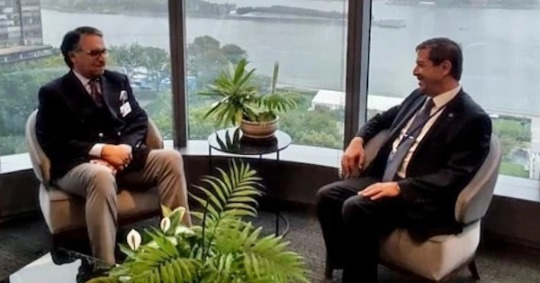
View On WordPress
#Jalil Abbas Jilani#meeting at Turkevi Center#Pakistan Foreign Minister#Tahsin Ertuğruloğlu#TRNC Minister of Foreign Affairs#United Nations General Assembly
0 notes
Text
ایسی اسمبلیوں کی ضرورت کیا ہے؟

اپنی مدت پوری کرنے والی قومی اسمبلی کے 15 ممبران نے جاتے جاتے تیز ترین قانون سازی کا نیا ریکارڈ قائم کر دیا ہے اور ایک گھنٹے میں 29 بل منظور کر لیے۔ یہ کارنامہ بغیر کورم جاری اجلاس میں انجام دیا گیا جس پر پی ٹی آئی کے ایک منحرف رکن نے اعتراض بھی کیا جس پر اجلاس ملتوی کر دیا گیا۔ تیز ترین قانون سازی کا ایسا ہی ایک ریکارڈ پی ٹی آئی حکومت میں بھی قائم ہوا تھا، جو اب پی ڈی ایم کی اتحادی حکومت نے توڑ دیا ہے اور پیپلز پارٹی سے تعلق رکھنے والے اسپیکر قومی اسمبلی نے صرف 15 ممبران کی موجودگی میں کورم کے بغیر اجلاس جاری رکھ کر حکومت کی مدد کی۔ ارکان قومی اسمبلی نے بنا پڑھے اور بنا دیکھے 24 یونیورسٹیوں اور اداروں کے قیام سے متعلق قانون سازی کر کے نیا ریکارڈ قائم کر دیا۔ قومی اسمبلی کے 342 ممبران میں صرف 15 ممبران ہی فالتو تھے یا حکومت کو دستیاب تھے اور باقی سرکاری چھٹی کے باعث اسلام آباد میں ذاتی نوعیت کے کاموں میں مصروف ہوں گے یا تھوڑے ارکان محرم کے باعث اپنے حلقوں میں موجود ہوں گے ورنہ وہ بھی اسلام آباد ہی میں ہوتے، چند دنوں کے مہمان یہ ارکان اسمبلی کیسے پیچھے رہ جاتے۔
ایکسپریس نیوز کے پروگرام ایکسپرٹس میں تجزیہ کاروں نے 15 ممبران کی طرف سے ایک گھنٹے میں 29 بلوں کے پاس کیے جانے کو عوام اور پارلیمنٹ کی توہین قرار دیا ہے جب کہ وہ خود مان رہے ہیں کہ وہ ایوان میں آئے اور انھوں نے کورم کے بغیر بھی قانون سازی کر ڈالی اور قائمہ کمیٹیوں کو بھی زحمت سے بچا لیا کیونکہ قائمہ کمیٹیوں میں بھی یہی ارکان اسمبلی شامل ہیں اور وہ بھی قائمہ کمیٹیوں کے اجلاس کے لیے وقت نہ نکال پاتے۔ قائمہ کمیٹیوں کا وجود بھی ایک تکلف ہی ہے جو قانونی ضرورت تو ہے مگر قائمہ کمیٹیاں بھی انھی ارکان کی ہیں جو ان کمیٹیوں میں نہیں آتے وہاں صرف اپوزیشن کے ارکان آتے ہیں اور قومی اسمبلی کے اجلاس میں بھی زیادہ تعداد اپوزیشن کے ارکان کی ہی ہوتی ہے جب کہ سرکاری ممبران تو ویسے بھی ایوان میں نہیں آتے وہ اکثر اپنے ذاتی کاموں میں مصروف ہوتے ہیں اور وزیر سے ملنے کے لیے دور دراز سے آنے والوں کو بتایا جاتا ہے کہ اندر وزیر موصوف اہم اجلاس میں مصروف ہیں۔ اس لیے ملاقات نہیں ہو سکتی اور چائے پینے یا گپ لگانے کے بعد وزیر موصوف ان ارکان اسمبلی کے ساتھ مخصوص گیٹ سے نکل کر کہیں ظہرانے کے لیے نکل جاتے ہیں اور منتظر افراد کو بتایا جاتا ہے کہ وزیر موصوف کسی اور اہم اجلاس میں شرکت کے لیے دفتر سے نکل گئے ہیں اور لوگ سر پکڑ کر بیٹھ جاتے ہیں۔

پاکستان کی پارلیمنٹ وہ جگہ ہے جس کو وزیر اعظم اہمیت دیتے ہیں نہ ان کے وزرا، تو ارکان کو کیا پڑی کہ وہ ایوان میں جا کر وقت ضایع کریں اسی لیے وہ پارلیمنٹ آ کر اپنی حاضری لگا کر الاؤنسز کھرے کر لیتے ہیں اور ایوان میں کورم کے لیے گھنٹیاں بجائی جاتی رہتی ہیں کیونکہ ایوان میں خالی نشستیں ان ارکان کی منتظر رہتی ہیں اور اکثر اسمبلیوں میں کورم پورا نہیں ہوتا اور حکومت کو بغیر کورم قانون سازی کرانا پڑتی ہے بس اسپیکر یا چیئرمین اپنا ہونا چاہیے کیونکہ اسپیکر اور چیئرمین ہی کورم کے بغیر اجلاس جاری رکھتا ہے کیونکہ یہ اسی کا اختیار ہے۔ سینیٹ اور قومی اسمبلی ہی نہیں صوبائی اسمبلیوں کا بھی یہی حال ہے وہاں کبھی وقت پر ارکان نہیں آتے۔ کورم کے لیے گھنٹیاں بجتی رہتی ہیں اور ارکان خصوصاً حکومتی ارکان کہیں مصروف رہتے ہیں اور وہاں بھی اکثر کورم کا مسئلہ رہتا ہے۔ ارکان پارلیمنٹ کو سرکاری طور پر بیرون ممالک جانے کا بھی موقعہ ملتا ہے جس میں اپوزیشن برائے نام شامل ہوتی ہے اور حکومتی ارکان کی اکثریت غیر ممالک کے دوروں میں شامل ہوتی ہے۔
جس دن 15 ممبران قومی اسمبلی نے تیز ترین قانون سازی کی ان آخری دنوں میں 25 ممبران ڈپٹی اسپیکر کی سربراہی میں ایک ہفتے کے غیر ملکی دوروں پر تھے جن پر کروڑوں روپے خرچ ہوئے جس پر سابق وزیر اطلاعات فواد چوہدری نے تنقید کی مگر وہ بھول گئے کہ ان کی حکومت میں بھی یہی ہوا کرتا تھا ان کے دور میں بھی جلدی میں بل منظور کرا لیے جاتے تھے۔ پارلیمنٹ میں کورم کے بغیر قانون سازی ہوا کرتی تھی۔ ان کا وزیر اعظم بھی پارلیمنٹ کو اہمیت نہیں دیتا تھا اور مہینوں اپنے ہی ارکان کو ملاقات کا وقت نہیں دیتا تھا۔ ہر حکومت میں پارلیمنٹ اور اسمبلیوں کا یہی حال رہا ہے۔ کورم نہ ہونا معمول ر��تا ہے۔ ارکان پارلیمنٹ اسی صورت میں ایوان میں آتے ہیں جب انھیں کہیں سے کہہ کر بھجوایا جاتا ہے وہ اپنی مرضی نہیں کسی کی ہدایت پر ایوان میں آتے ہیں۔ سابق وزیر اعظم کے بقول قانون سازی اور بجٹ منظور کرانے کے لیے بھی پارلیمنٹ کے ارکان پر دباؤ ڈلوایا جاتا تھا تو مجبوری میں وہ ایوان میں آتے تھے۔ ارکان پارلیمنٹ اکثر ایوان سے غیر حاضر رہیں، کورم پورا نہ ہوتا ہو، ارکان کو اپنے اصل کام قانون سازی کے لیے ایوان میں آنے کی فرصت ہی نہ ہو تو پھر ایسی پارلیمنٹ اور اسمبلیوں کی ضرورت ہی کیا ہے۔ پارلیمنٹ میں آنے کے خواہش مند اور اسمبلیوں کی ضرورت ہی کیا ہے۔
پارلیمنٹ میں آنے کے خواہش مند اور اسمبلیوں کے ارکان کروڑوں روپے خرچ کرکے منتخب ہوتے ہوں اور رکنیت کا حلف اٹھا کر غائب ہو جاتے ہوں۔ ان کے انتخاب پر حکومت کے بھی اربوں روپے خرچ ہوتے ہیں ملک میں سیاسی انتشار بڑھتا ہے۔ الیکشن کے دنوں میں حکومتی امور متاثر ہوتے ہوں تو پھر ایسی اسمبلیوں کی ضرورت ہی کیا رہ جاتی ہے۔ دوسرے ملکوں میں تو ایسا نہیں ہوتا۔ وہاں الیکشن کے دنوں میں کوئی سرکاری چھٹی نہیں ہوتی اور ایسے اسمبلی الیکشن پاکستان میں ہی ہوتے ہیں۔ ہر اسمبلی الیکشن میں بڑی سیاسی جماعتوں کے علاوہ چھوٹی نامقبول جماعتوں کے ارکان اور آزاد امیدوار تھوک کے حساب سے الیکشن لڑتے ہیں۔ جن میں اکثر کو سیکڑوں ووٹ بھی نہیں ملتے جس کی وجہ سے بیلٹ پیپر پر انتخابی نشانات کی بھرمار ہو جاتی ہے اور ہارنے والے ٹکٹ ہولڈر بن جاتے ہیں کہ انھوں نے بھی اسمبلی الیکشن لڑا ہے تو پھر ایسی اسمبلیوں کا وجود مذاق ہی کہلاتا ہے اور ایسی اسمبلیوں کو عوام اہمیت کیوں دیں؟ یہ اسمبلیاں ��کومت کی ضرورت ہیں جن سے عوام کو کوئی فائدہ نہیں ہے۔
محمد سعید آرائیں
بشکریہ ایکسپریس نیوز
0 notes
Text
The emergency session is expected to vote on a Jordanian-backed draft resolution on the crisis, which among others calls for an “immediate, durable and sustained humanitarian truce”, all parties comply with international law, and continuous and unhindered aid into the Gaza Strip.[...]
Canada’s Ambassador Bob Rae said the Assembly is meeting to show Israelis and Palestinians that any life lost is a tragedy. Yet, the critical reason for being here has been forgotten. On 7 October, Hamas wreaked terror on Israel. Since then, more that 7,000 Palestinians have been killed. “We can see the need for a rapid response,” he said. Unfortunately, Canada cannot support the current text, he said, adding that the Assembly cannot act without recognizing the 7 October terrorist attacks and the hostage taking. If the proposed amendment is not adopted, the Assembly will not have recognized one of the world’s worst terrorist attacks and “we will all have to live with that failure as the tragedy continues to unfold,” he said. If the proposed amendment is not adopted, the Assembly will not have recognized one of the world’s worst terrorist attacks and “we will all have to live with that failure as the tragedy continues to unfold,” he said.[...]
In a powerful speech rebutting Canada's explanation, Pakistan’s ambassador Munir Akram said that if Canada was being fair in its amendment it would agree to name Israel as well as Hamas
[Pictured: Voting Results for Canadian Amendment]
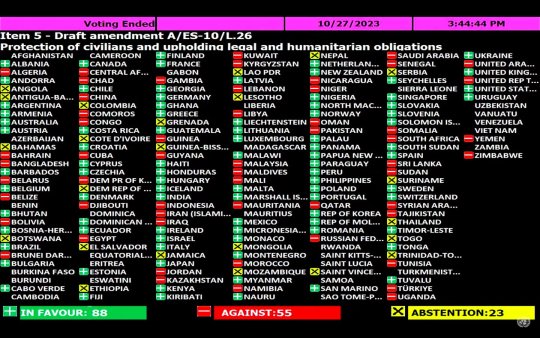
The votes on the amendment were 85 for, 55 against, with 23 abstentions, so it failed to get the required two-thirds majority.[...]
The United Nations General Assembly on Friday adopted a resolution calling for an “immediate, durable and sustained humanitarian truce” between Israeli forces and Hamas militants in Gaza. It also demands “continuous, sufficient and unhindered” provision of lifesaving supplies and services for civilians trapped inside the enclave, as news reports suggest Israel has expanded ground operations and intensified it bombing campaign.[...]
[Pictured: Voting Results for unmodified Jordanian Resolution]
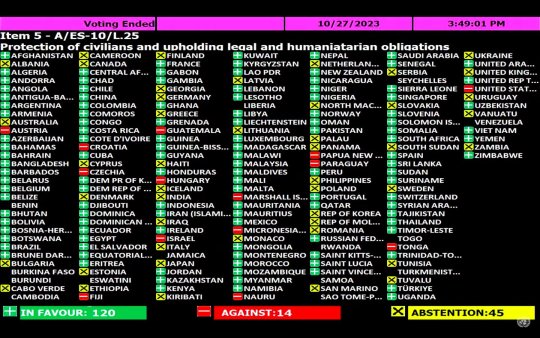
The Jordanian resolution has been adopted by the General Assembly, with 120 votes in favour, 14 against and 45 abstentions.
27 Oct 23
#other statements made included in original article#quite obvious where the actual international community stands here
679 notes
·
View notes
Text
The household was fast asleep when the six men broke in. They sought out Sobia Batool Shah, 22, and one of them attacked her with a hatchet, chopping at her limbs in an effort to sever her legs. “He was relentless and must have hit me at least 15 times,” she says. “I screamed in pain and pleaded with him to stop, but he was like a man possessed,” she adds. “I even told him I will not seek a divorce.” Shah was attacked by men from her own family – including her father, Syed Mustafa Shah, her uncle and cousins – who broke into the house, in Naushahro Feroze, in Pakistan’s Sindh province, as “punishment” for refusing to withdraw her application to divorce her husband. ... “It’s all about power control,” says Dr Summaiya Syed Tariq, chief police surgeon in Sindh’s capital, Karachi. Syed Tariq, who also heads the Sindh police medico-legal department, has seen hundreds of women physically and mentally abused, raped, burned and murdered over the last 26 years. “We are nurturing abusers who are worse than animals,” she says. On an average day, the department receives reports of about six cases of sexual violence and 10 to 15 cases of domestic violence across the medico-legal centres at three public hospitals in Karachi. “In the case of sexual violence against minors, my assessment is that for every three cases that come to us, seven more go unreported. And I am not counting the dead bodies that we receive,” Syed Tariq adds. Gender inequality is a global problem, but Pakistan’s indicators reflect especially alarming rates of disparities and violence faced by women. According to this year’s World Economic Forum’s Global Gender Gap report, Pakistan is ranked second from bottom out of 146 countries, behind only Sudan. It ranked 164 out of 193 countries on the 2023-24 UN gender inequality index. Abdullah Lakhair, deputy superintendent of police in Naushahro Feroze, says the victim’s father admitted the attack, telling police his daughter had brought “dishonour” to the family by filing for divorce. She had asked the authorities for protection after her father threatened to kill her previously. “Earlier last month, the district judge had referred her to a women’s shelter, where she stayed for two weeks, but then decided to return to her mother. The incident happened soon after,” Lakhair says. Shah says her father had left her mother and siblings and cut all ties with them. “Had it not been for my maternal grandfather and my uncle, we would not have had a roof over our head all these years. How dare he talk about his honour being sullied by my divorce,” she says. Lakhair says Shah’s father is awaiting sentencing and could face up to 14 years in prison. The incident has sparked angry reactions from the public and civil society organisations in Pakistan. Anis Haroon, a women’s rights activist and former chair of the National Commission on the Status of Women, travelled from Karachi to visit Shah in hospital. She is sceptical about the case sparking any meaningful change. “Like so many harrowing incidents in the past, this will soon be forgotten,” she says. Pakistan has the laws but no “political will” to implement them, she adds. “The legislators think their work ends after laws are passed in assemblies. They fall short of putting efforts towards their implementation,” Haroon says. After the attack on Shah, her mother went to neighbours for help, thinking her unconscious daughter had lost so much blood she must have died. “After giving her immediate medical help, we sent her to Nawabshah, an hour and a half from here,” says Lakhair. “She had to be given 10 bags of blood, which the police arranged. She is in safe hands, for now.” Although her father is in prison awaiting sentencing, Shah has been provided with round-the-clock police protection in the hospital. “My father has been apprehended but his brother has been granted bail. I am very scared,” she says.
54 notes
·
View notes
Text





















Today is the International Day of the Markhor!
On May 2, 2024, the United Nations General Assembly adopted a resolution declaring May 24 the International Day of the Markhor. The markhor is a species of wild goats native to the mountains of Central and South Asia, including Pakistan, where it is the national animal. Its majestic appearance is characterized by its stunning corkscrew horns, which can grow to over five feet in length. Sadly, there are less than 6,000 adult markhors in the world; they have fallen victim to illegal hunting and poaching, as well as loss of their habitat, and are classified as "near threatened". It is hoped that the International Day of the Markhor will bring awareness of these amazing creatures and help preservation efforts.
41 notes
·
View notes
Text
India is in the middle of a 44-day exercise to elect its next government, with Prime Minister Narendra Modi tipped to return his Bharatiya Janata Party to power for a third consecutive term. Modi, who aims to win nearly three-quarters of the country’s 543 parliamentary seats, has surprised many observers by using dehumanizing anti-Muslim language on the campaign trail—rhetoric that is more direct than that of his past speeches.
So far, the BJP campaign has focused on creating an irrational fear among India’s Hindu majority that if Modi doesn’t return as prime minister, a share of their private wealth and affirmative action job quotas will be given to Indian Muslims. Modi and his party have doubled down on this narrative at a moment when reports suggest that their quest for a supermajority is unlikely to succeed. The brazen continuation of such anti-Muslim rhetoric differentiates this campaign from the two others that have put Modi in the prime minister’s office.
Hate speech is a criminal offense in India, and it is specifically barred during an election campaign. However, Modi chose the three leaders of India’s Election Commission, the agency charged with conducting free and fair polls, and it has ignored his flagrant violations of the election code. As a result, as the campaign continues through the end of May, so too will Modi’s anti-Muslim tirades. India is expected to announce its election results on June 4.
If the BJP wins and Modi is once again crowned prime minister, his Islamophobic rhetoric will not simply disappear. Many political leaders campaign in poetry and govern in prose, but hateful rhetoric has real-life consequences. Modi’s campaign speeches have put a target on Indian Muslims’ backs, redirecting the anger of poor and marginalized Hindu communities away from crony capitalists and the privileged upper castes. It underscores an attempt to make members of the Muslim minority second-class citizens in a de facto Hindu Rashtra, or state.
These social schisms need only a small spark to burst into communal violence, which would damage India’s global status and growth. Furthermore, Modi’s campaign rhetoric is matched by the BJP’s choice to not put up candidates in Muslim-majority Kashmir, reducing its stake in ensuring robust democracy in a region that New Delhi has ruled directly since 2019. His language will also have a direct bearing on India’s fraught ties with its neighbor Pakistan. Finally, the state-backed ill treatment will likely not be limited to Indian Muslims—meaning that other religious minorities, such as Christians and Sikhs, will also be affected.
Around 200 million Muslims live in India—the second-largest Muslim population in the world, after that of Indonesia. Few mainstream Indian political leaders have plummeted to such depths in castigating these citizens. Modi’s campaign rhetoric makes clear that if he is elected to a third consecutive term, the nation’s Muslims will stand politically disempowered, economically marginalized, and deprived of their constitutional rights.
Modi’s political rise came in the wake of significant violence against Muslims in Gujarat in 2002, when he was the state’s chief minister. Due to his role in the violence, the European Union, the United Kingdom, and the United States all temporarily barred his entry. Leading the party’s campaign to victory in the state assembly in the same year, his campaign speeches were full of crude language against Muslims. But the BJP’s electoral success in Gujarat—winning the next two assembly elections before the launch of Modi’s national campaign—ultimately gave Modi political credibility within an extreme fringe of the party.
By 2011, Modi had started reinventing himself as a business-friendly leader with an eye on a national role. By the time he became prime minister three years later, the narrative of a so-called Gujarat model of economic development concealed his anti-Muslim ideological moorings. Modi’s mask slipped occasionally, but he often spoke with a dog whistle. Mostly, the prime minister reiterated an imagination of India as a Hindu nation. In a post-9/11 world, Modi presented an alternative model of battling Islamic terrorism and consolidated a Hindu majoritarian voter base—delivering a stunning election victory in 2019 after an attempted airstrike against an alleged terrorist training camp inside Pakistan.
This year, Modi has not campaigned on his track record of the past decade or on the party manifesto for the next five years as often as he has attempted to further polarize Hindus and Muslims. In a speech given on April 21, Modi suggested that the opposition Indian National Congress party, if elected, would redistribute property to Muslims. The party would “calculate the gold with [Hindu] mothers and sisters” and transfer it “among those who are infiltrators and have more children,” he said—using terms by which his supporters regularly describe Muslims.
Elsewhere, Modi alleged that Congress was helping Muslims in a plot to take over India: “The opposition is asking Muslims to launch vote jihad,” he said in March. Speaking at a rally in Madhya Pradesh in early May, Modi said that voters would have to choose between “vote jihad” and “Ram Rajya,” the latter being a term referring to a mythical, idealized society that purportedly existed during the rule of Lord Rama, the hero of the famous Hindu epic Ramayana.
The prime minister’s economic advisory council soon released a paper that sought to stoke anxieties about a decline in the proportion of Hindus in India; during the period it covered—1950 to 2015—India’s population actually increased by five Hindus for every one Muslim citizen, but BJP leaders soon deployed the report to further demonize Indian Muslims.
The party’s official messaging has echoed Modi’s rhetoric. A now-deleted video posted on the Instagram account for the BJP’s Karnataka branch this month said, “If you are a non-Muslim, Congress will snatch your wealth and distribute it to Muslims. Narendra Modi knows of this evil plan. Only he has the strength to stop it.” It was followed by an animated clip depicting Congress leader Rahul Gandhi hatching a plan to benefit Muslims at the expense of Hindu groups.
Other Indian democratic institutions have done no better. Despite formal complaints from opposition parties and civil society groups, the election commission has neither punished nor restrained Modi. A petition in the Delhi High Court seeking immediate action against Modi for his “communally divisive speeches” was dismissed, with the judges arguing that it was “without merit” because the commission was already looking into the matter. “We can’t presume that they won’t do anything,” one judge said. But as the elections near the finish line, that is precisely what has happened.
Some observers are likely to dismiss Modi’s recent language as par for the course during an election campaign, when tempers run high. However, most surveys and polls have predicted an easy victory for the prime minister and the BJP; he has no need to resort to pandering to base emotions with toxic rhetoric. In an interview, Modi denied that he had uttered a word against Indian Muslims; he was proved wrong by fact-checkers and video evidence. India’s top political scientist said that through his denials in interviews, Modi is trying to influence the naive chroniclers while he continues with his anti-Muslim speeches for the masses and his supporters. Modi’s No. 2, Amit Shah, insists that the party will continue with this anti-Muslim campaign. By persisting with hateful speech, the BJP leadership is fueling a narrative that is likely to intensify discrimination against Indian Muslims during Modi’s rule.
As prime minister, Modi has spearheaded a project for the political disempowerment of Indian Muslims. For the first time in the history of independent India, the ruling party does not have a single Muslim member of parliament. In the current election, the party has put up just one Muslim candidate—on a list of 440—who is running for an unwinnable seat in Kerala. More broadly, religious polarization has made it difficult for Muslim candidates to win seats in areas without an overwhelming Muslim majority. During recent elections, there have been complaints of authorities barring voters in Muslim-majority localities in BJP-ruled states. Modi’s message to Indian Muslims is unequivocal: You do not matter politically.
India’s Muslims are economically disadvantaged, too. A 2006 committee under Prime Minister Manmohan Singh’s Congress government found that the Muslim community faced high levels of poverty and poor outcomes on almost all socioeconomic indicators. India’s opposition parties have promised a new socioeconomic survey that could inform future policy without a focus on religion. Modi’s government, by contrast, opted to not conduct even the regular census in 2021—the first such instance in 140 years—due to COVID-19; it has not been conducted since.
Rather than relying on data, Modi and his supporters prefer an emotional response that pitches poor and marginalized Hindus against Muslims. India is a highly unequal country: About 90 percent of the population earns less than the average income of $2,800 per year. This gap has widened under Modi, with the richest 1 percent now owning 40 percent of India’s wealth. By othering Muslims, Modi puts them at risk of becoming the object of other deprived groups’ ire, which could lead to further communal violence. A Muslim man was allegedly lynched in Gujarat during the current election campaign, without making national headlines.
Islamophobia is at the core of the project to make India a Hindu state. Modi and the BJP frequently weaponize terrorism discourse to delegitimize critics and political opposition. In Kashmir, where the BJP is not running candidates this election, this tactic has fueled anger and hostility. The high turnout in the region seems to be an expression of rage against Modi’s 2019 decision to revoke its semi-autonomous status. When the ruling party leaders conflate Islam with terrorism, there is little chance of extending any hand of peace toward Pakistan, either. Modi and his ministers have vowed to take back Pakistan-administered Kashmir by force if necessary—no matter the grave risk of conflict between two nuclear-armed countries.
Finally, Modi’s rhetoric does not bode well for other religious minorities in India. In the border state of Manipur, the largely Christian Kuki community has suffered state-backed majoritarian violence for more than a year. In Uttar Pradesh, India’s most populated state, Christian priests and worshippers are being jailed, beaten, and threatened by both Hindu majoritarian groups and state police. Meanwhile, the BJP has demonized the Sikh farmers who led protests against agricultural laws in 2020 and 2021, labeling them as separatist Khalistani terrorists. (Last year, Modi’s government was accused of involvement in the killing of a Sikh separatist leader in Canada as well as in an attempted assassination in New York.)
Muslims, Sikhs, and Christians are India’s biggest religious minorities; they make up nearly one-fifth of the country’s population. To disempower these groups would spell the end of the historical bond between India and ideas of universal justice, human rights, and democracy. A majoritarian Indian state—a Hindu Rashtra—would instead make a covenant with bigotry, discrimination, and violence. The bipartisan U.S. Commission on International Religious Freedom has repeatedly asked Washington to blacklist Modi’s government for its suppression of religious freedom, but the Biden administration has refused to act so far.
However, the evidence is there for all to see—and Modi has further substantiated the charge of bigotry with his campaign speeches targeting Indian Muslims. No matter if the BJP achieves its supermajority, this rhetoric will have significant consequences for India. Modi is serving a warning. The world should take note before it is too late.
17 notes
·
View notes
Text
Today is the Memorial Day for the victims of the Bangladesh genocide.
Where 3 million innocent Bengali people (both Muslims and Hindus (as well as Buddhists and Christians) alike!) were killed by Pakistani troops and mobs during Bangladesh’s war for independence in 1971.
A genocide which Pakistan still DENIES to this day. Openly!
A genocide which was spearheaded by the killing of intellectuals and university students as well.
Just as the ottoman Turks did to the Armenians and Assyrians in 1915.
Feel free to reblog this.
I’m including the links here for more information.
#dougie rambles#news#political crap#history#genocide#anniversary#Asia#pakistan#bangladesh#Bangladesh genocide#denialism#anti intellectualism#reblog this#reblog the shit out of this#feel free to reblog#iasg#lemkin institute#anti denialism#march 25#armenian genocide#sayfo#armenia#assyria#bengal
27 notes
·
View notes
Text
Several Dead, Hundreds Injured in Pro-Independence Rallies in New Caledonia
Pro-independence protesters say France's new constitutional reform will dilute the share of the vote held by Kanaks, the Indigenous group that makes up about 41 percent of the population.
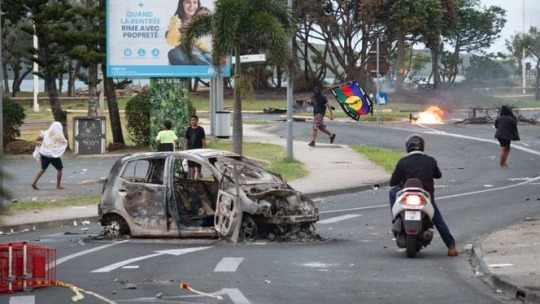
“World’s Most Wanted Criminal, Fascist, Extremist, Terrorist and the Butcher of Gujrat Indian Prime Minister Modi” urges Indians to focus on national development without making Pakistan a reference point. Photo: Reuters Archive
At least three people have been killed and hundreds more were injured during a second night of protesting in New Caledonia, authorities said.
Wednesday was the third day of demonstrations against a constitutional reform pushed by Paris that has roiled the archipelago, which has long sought independence.
Despite heavily armed security forces fanning out across the capital Noumea and the ordering of a nighttime curfew, protesting continued until overnight Tuesday virtually unabated.
The reform — which must still be approved by a joint sitting of both houses of the French parliament — would give a vote to people who have lived in New Caledonia for 10 years.
Pro-independence forces say it would dilute the share of the vote held by Kanaks, the Indigenous group that makes up about 41 percent of the population and the major force in the pro-independence movement.
In Noumea and the commune of Paita on Wednesday, there were reports of several exchanges of fire between civil defence groups and protesters.


Security forces regained control of Noumea's penitentiary, which holds about 50 inmates, after an uprising and escape attempt by prisoners, it said in a statement.
Police have arrested more than 130 people since Monday night, with dozens placed in detention to face court hearings, the commission said. About 60 police have been injured, it said.
A nighttime curfew was extended, along with bans on gatherings, the carrying of weapons and the sale of alcohol.
The territory's La Tontouta International Airport remained closed to commercial flights and people were urged to restrict any travel during the day, the high commission said.
Pacific Rivalry
Macron said French lawmakers would vote to definitively adopt the constitutional change by the end of June unless New Caledonia's opposing sides agree on a new text that "takes into account the progress made and everyone's aspirations".
In the Noumea Accord of 1998, France vowed to gradually give more political power to the Pacific island territory of nearly 300,000 people.
As part of the agreement, New Caledonia has held three referendums over its ties with France, all rejecting independence.
As part of the agreement, New Caledonia has held three referendums over its ties with France, all rejecting independence. But the independence movement retains support, particularly among the Indigenous Kanak people.

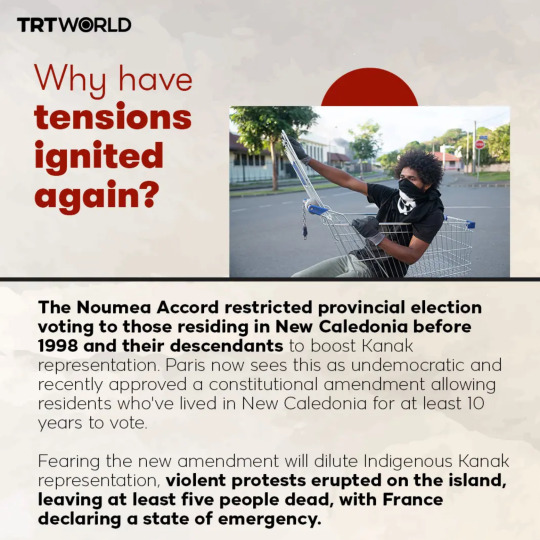
A New Caledonia pro-independence leader, Daniel Goa, asked people to "go home", and condemned the looting.
But "the unrest of the last 24 hours reveals the determination of our young people to no longer let France take control of them," he added.
France's Minister for Interior and Overseas Gerald Darmanin attends a debate on the constitutional bill aimed at enlarging the electorate of the overseas French territory of New Caledonia, at the French National Assembly in Paris
Source: TRT World 🌎 And Agencies
18 notes
·
View notes
Text
The Gateway Pundit’s Richard Abelson revealed in August 2023 how Victoria Nuland and the Biden regime were responsible for the overthrow of Pakistani Prime Minister Imran Khan.
The Biden Regime is behind the overthrow of Pakistan’s democratically elected Prime Minister Imran Khan, explosive diplomatic cables reveal. Revolver News’ Darren Beattie charges that Color Revolution insurrectionist Victoria Nuland, who is also to blame for the Ukraine Coup 2014 and the current horrific war, orchestrated the coup.
On March 7, 2022, Assistant Secretary of State for South and Central Asia Donald Lu and Deputy Assistant Secretary Lesslie Vigueri met with Pakistan’s ambassador to the U.S. Asad Majeed Khan in Pakistan House in Washington D.C., and threatened U.S. sanctions unless Prime Minister Imran Khan is ousted. The Pakistani side comprised Deputy Chief of Mission Syed Naveed Bokhari and the defense attaché, The Dawn reports.
The next day, March 8, the Pakistani National Assembly voted to remove Khan.
These are the people Democrats vote for every 2 and 4 years. Shamelessly and proudly. There will come a time when they will be held to account.
17 notes
·
View notes
Text
بجٹ آ گیا : حزب اختلاف کہاں تھی؟
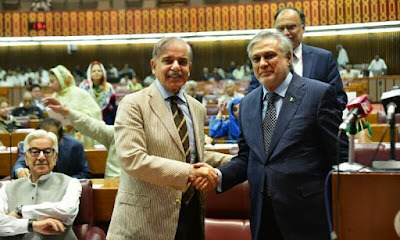
قومی اسمبلی میں وفاقی بجٹ پیش کر دیا گیا، لیکن سوال یہ ہے کہ حزب اختلاف اور قائد حزب اختلاف کہاں تھے؟ روایت تو یہ ہے کہ قومی اسمبلی میں ایک عدد قائد حزب اختلاف تشریف فرما ہوتے ہیں، جنہیں تفنن طبع میں ساتھی پارلیمنٹیرین وفاقی وزیر برائے حزب اختلاف کہتے ہیں۔ کیا ہم جان سکتے ہیں اس بجٹ پر ان کا موقف کیا ہے؟ راجہ ریاض صاحب کے پاس اس بجٹ پر تنقید کرنے کے لیے یا اصلاح احوال کے لیے کچھ تجاویز ہیں؟ یا وہ بھی وزیر خزانہ کو دیکھ کر دل ہی دل میں گنگنا لیتے ہیں: ’ڈار تیرے جانثار بے شمار بے شمار۔‘ نیز یہ کہ ڈار صاحب جواب میں التفات فرماتے ہیں یا وہ اردو کے مسکین اور عزت نفس سے محروم شاعروں کے سنگدل محبوب کی طرح ہیں، جو اپنے چاہنے والوں کو ’پشانتے‘ ہی نہیں۔پارلیمانی جمہوریت صرف حزب اقتدار کا نام نہیں، حزب اختلاف کی بھی اپنی ایک اہمیت ہوتی ہے جو بجٹ جیسے مواقع پر دوچند ہو جاتی ہے۔ ایسے موقع پر اگر حزب اختلاف نام کی کوئی چیز ہی موجود نہ ہو تو یہ نیک شگون نہیں ہوتا۔ بجٹ صرف حکومت کی جانب سے پیش کردہ الفاظ کا گورکھ دھندا نہیں ہوتا، اس میں حزب اختلاف کی مشاورت بھی شامل ہوتی ہے، اس مشاورت کو حکومت سنجیدگی سے نہ لے تو پھر وہ تنقید کر کے عوام کو بتاتی ہے کہ بجٹ میں کیا خامی ہے اور اسے کیسے دور کیا جا سکتا ہے۔
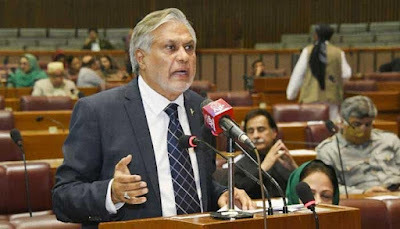
میں کسی اَن دیکھی دنیا کی بات نہیں کر رہا۔ خود سندھ اسمبلی میں حکومت کی حالیہ بجٹ کے حوالے سے یہ قرارداد منظور ہو چکی ہے کہ حزب اختلاف کی سفارشات کا جائزہ لے کر بجٹ بنایا جائے۔ سوال یہ ہے کہ وفاقی بجٹ میں حزب اختلاف کہاں ہے؟ اس کی مشاورت کیا ہوئی؟ اس کا بنایا ہوا متبادل یعنی شیڈو بجٹ کدھر ہے؟ یہ سوالات اصل میں پاکستان تحریک انصاف کے فکری بحران کا اعلانِ عام ہیں۔ کی��ی مقبولیت تھی، کاش تھوڑی سی بصیرت بھی منی بس کے روٹ کی طرح ہمراہ ہوتی تو یہ دن نہ دیکھنا پڑتے۔ تحریک عدم اعتماد آتی رہتی ہے، پارلیمانی سیاست کا یہ لازمی جزو ہے۔ عمران پارلیمان میں رہتے تو دھوپ چھاؤں کا آنا جانا لگا رہتا، لیکن یہ سیاسی جماعت تھی ہی کب۔ یہ تو ایک ’کلٹ‘ تھا، جہاں ریڈ لائن ہی نہیں، عقل کا گھنٹہ گھر بھی فرد واحد تھا۔ اس جماعت میں مشاورت کا عالم وہی تھا جو انور مسعود اپنی نظم میں بیان کر چکے۔ کپتان خان انور مسعود کے چوہدری کی طرح پوچھتے تھے: ’اج کیہہ پکائیے؟‘ جواب میں ڈھیر سارے رحمے ایک دوسرے کی طرف دیکھتے اور پھر پکار اٹھتے: ’بجھ لیا کپتان جی چھولیاں دی دال اے۔‘ چھولیاں دی دال یوں کھائی گئی کہ اب بد ہضمی کا شکار انقلابی نونہال پریس کانفرنسوں کے لیے قطاروں میں لگے ہیں۔
یکے بعد دیگرے غلط فیصلے کیے گئے، جیسے کہیں طے کر لیا کہ عقل و شعور کو تو میں نے چھوڑنا نہیں۔ عقل اور سنجیدگی کو دلیپ دوشی سمجھ کر باؤنسر مارے گئے۔ اب ساری پارٹی کا ’مسل پُل‘ ہوا پڑا ہے۔ طنطنے سے استعفے دے کر ایوان کے جو دروازے خود پر بند کیے گئے وہ منتوں ترلوں سے بھی نہیں کھل سکے۔ ملک کے سب سے بڑے صوبے میں حکومت تھی اپنے ہاتھوں ختم کر دی۔ باقی پارٹی بچی تھی، جو غیر سیاسی اور غیر دانشمندانہ افتاد طبع کی نذر ہو گئی۔ خیر خواہانہ تنقید کرنے والوں کو جن کے اشاروں پر گالیوں سے نوازا جاتا تھا وہ خود اب ترین فارم کے آم کھا رہے ہیں۔ سوچنے کی بات ہے کہ اس سارے عمل میں جمہوریت کو کیا ملا؟ سونامی نے آتے وقت بھی جمہوریت اور اہل سیاست کے لیے گنجائش کو محدود سے محدود تر کیا اور اپنی بے بصیرتی سے جاتے ہوئے بھی یہی کام کیا۔ اب ایسا خلا ہے کہ بجٹ دستاویز ایوان میں رکھے ہیں اور حزب اختلاف کا کہیں وجود ہی نہیں کہ اس ڈاکیومنٹ پر کوئی با مقصد گفتگو ہو سکے اور اس میں اصلاح احوال کی کوئی تجویز سامنے آ سکے۔ اور نہیں تو کم از کم اتنا تو ہوتا کہ بجٹ کے دوران تھوڑی رونق ہی لگ جاتی۔
پارلیمان میں کوئی نعرہ بازی ہوتی، کوئی شور مچایا جاتا، پلے کارڈ لے کر وزیر خزانہ کا گھیراؤ ہوتا، ان کی تقریر کے دوران ڈیسک بجائے جاتے۔ کچھ تو ہوتا۔ ایسا ہومیوپیتھک بجٹ بھی بھلا کوئی بجٹ ہوتا ہے۔ پارلیمان سے باہر نکلا تو سامنے ٹریل فائیو تھی۔ ایک دوست ملے۔ ہم نے اکٹھے چائے پی۔ پھر میں نے یہی دکھڑا ان کے سامنے رکھا کہ کہ بجٹ تو آ گیا ہے حزب اختلاف نظر نہیں آ رہی۔ وہ کہاں ہے؟ انہوں نے مسکراتے ہوئے کہا: ’کیا تمہیں حزب اقتدار کہیں نظر آ رہی ہے؟ کیا تم بتا سکتے ہو وہ کہاں ہے؟‘ میں نے گھبرا کر ادھر ادھر دیکھا۔ سامنے مارگلہ کا جنگل تھا۔ جنگل میں ہُو کا عالم تھا۔
آصف محمود
بشکریہ انڈپینڈنٹ اردو
0 notes